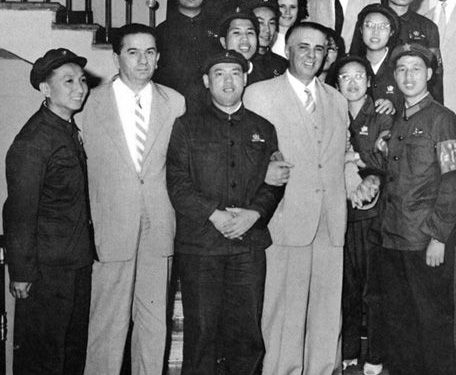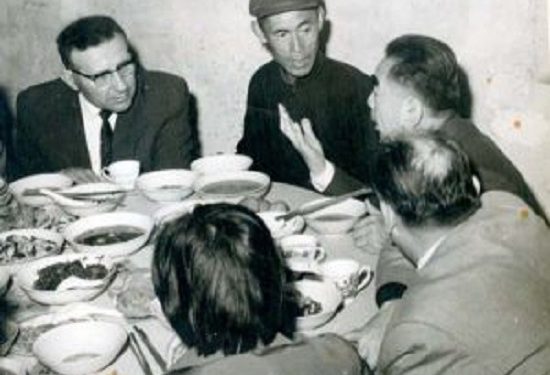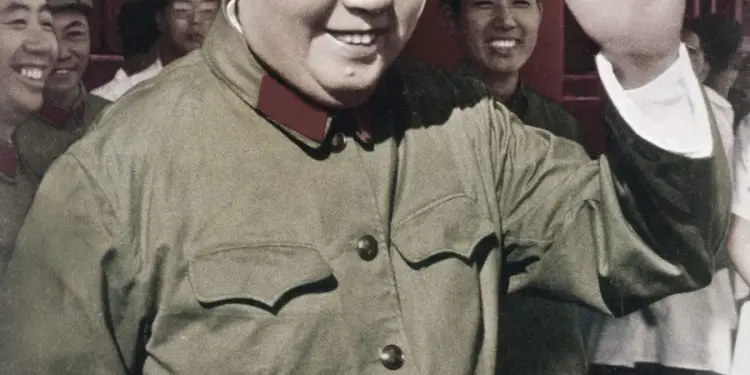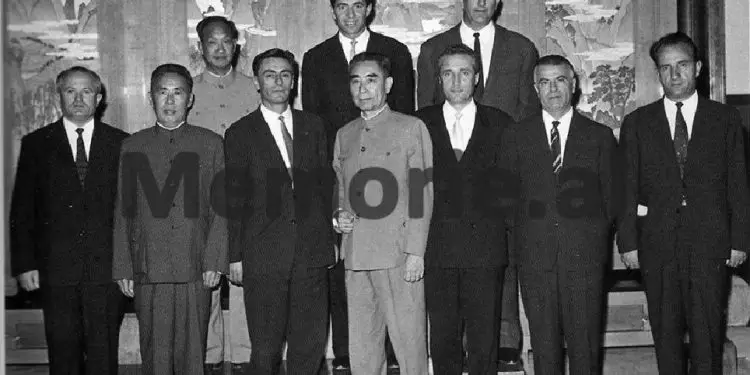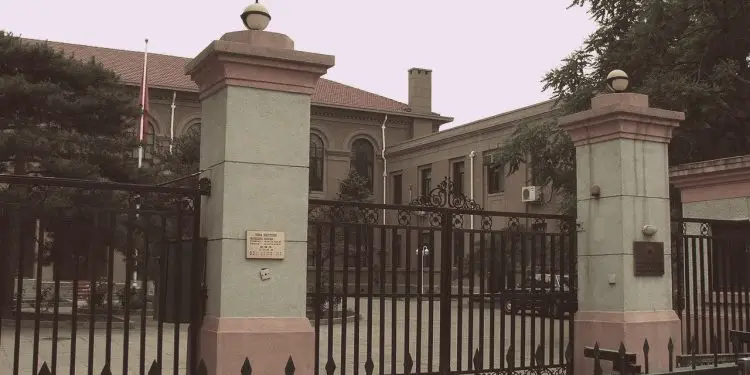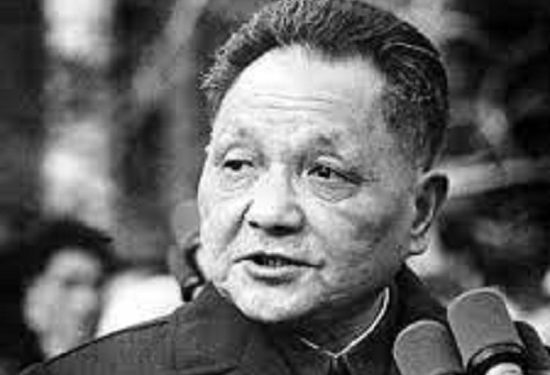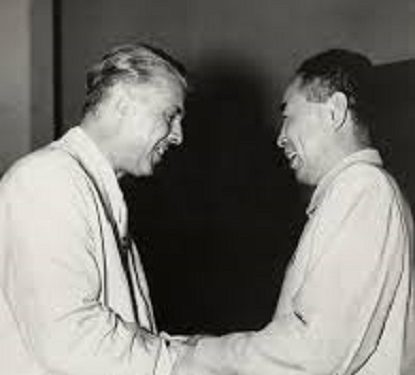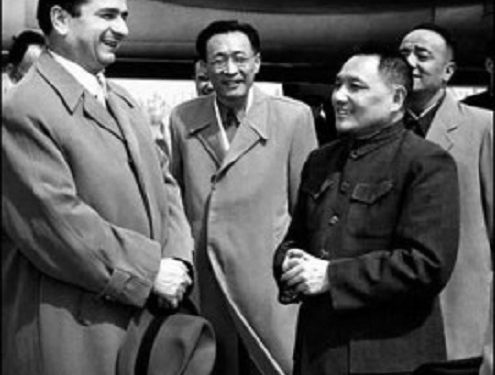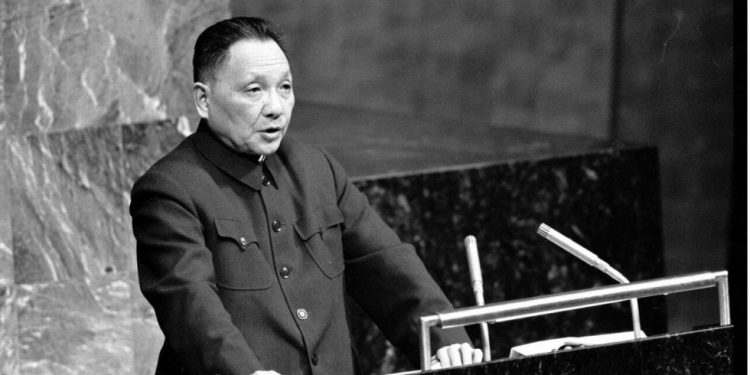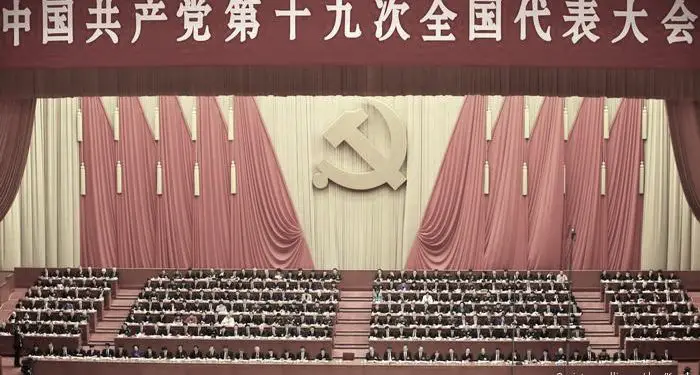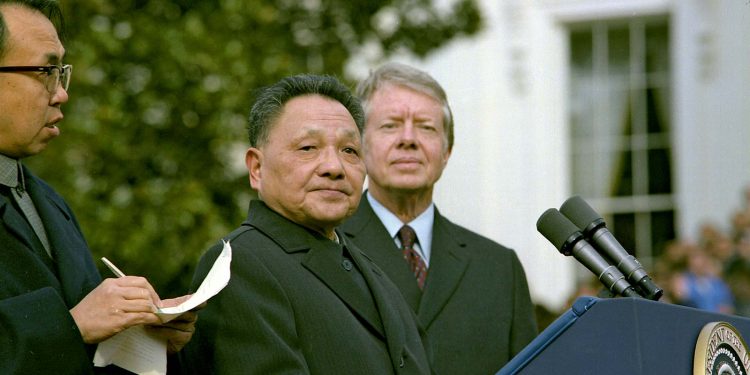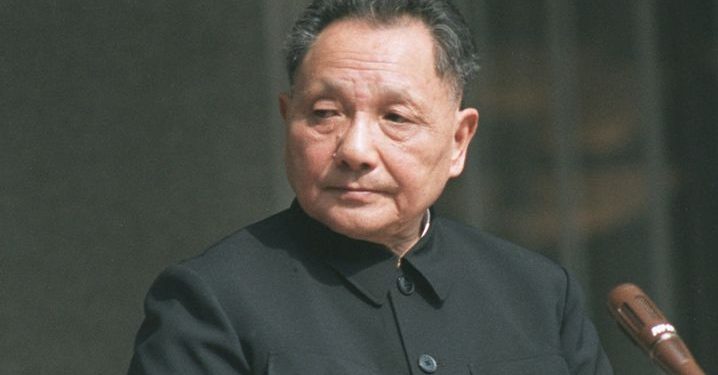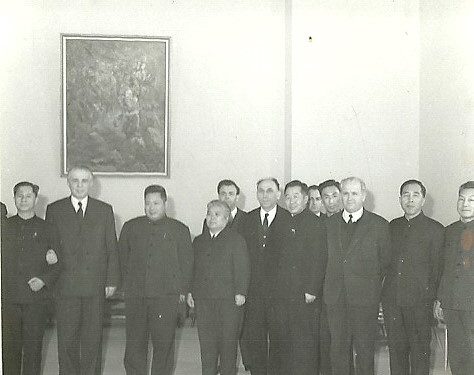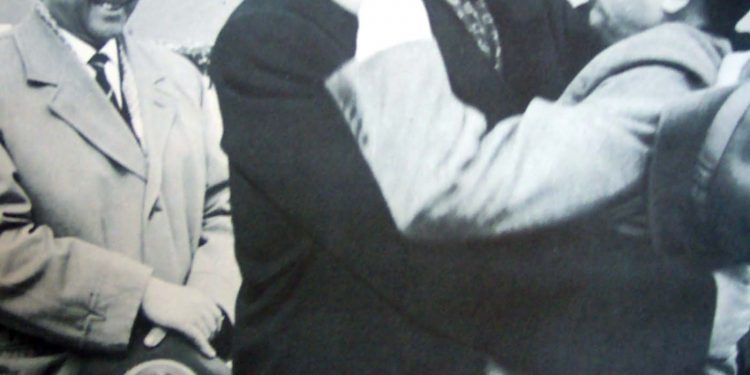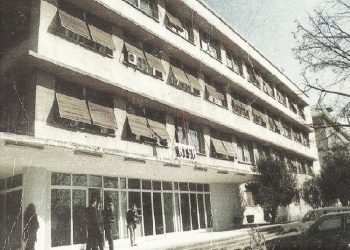Dashnor Kaloçi
The first part
Memorie.al publishes some archival documents extracted from the Central State Archive (fund of the former Central Committee of the ALP), where there is a record of the meeting of the senior party delegation of the ALP leadership headed by Hysni Kapo and Ramiz Alia, at the reception given in their honor by the Government of the People’s Republic of China, chaired by the Deputy Chairman of the Council of Ministers, Chu En Lai and Wu Xiuquan, Deputy Director of the Department for Relations with Outside the Central Committee of the Communist Party of China.
The full minutes of that meeting held at the headquarters of the Central Committee of the Communist Party of China on June 11, 1962, which took place just a few months after the senior leadership of the ALP and official Tirana, had severed diplomatic relations with The Soviet Union led by Nikita Hurshov, where the two members of the Politburo and the secretaries of the Central Committee of the ALP, Kapo and Alia, were sent by Enver Hoxha on a special mission to seek economic assistance from the People’s Republic of China, which consisted mainly of cereals, after a great crisis that communist Albania was going through at the time as a result of the great drought, as well as the Nitrogen Fertilizer Plant that was planned to be built in the city of Fier.
The numerous requests and prayers of Hysni Kapos and Ramiz Alia to the Chinese side for economic aid, telling them that their country was on the verge of disaster and that the Albanian government had also affected the state reserves that were destined for the army in case of war and the response Chu En Lait, to meet the demands they had promised the Albanian government, arguing with the great problems that China itself had at the time, not only as a result of the great drought that had prevailed there that year , but also for the fact that they could not import the technology and machinery from Italy, for the Nitrogen of Fier, which they had promised to the Albanian government!
Minutes of the meeting of the Albanian delegation led by Hysni Kapo and Ramiz Alia, at the reception given at the headquarters of the Central Committee of the Communist Party of China, by Deputy Prime Minister Chu En Lai, on June 11, 1962
(At the meeting our side was also represented by our Ambassador to the People’s Republic of China, Comrade Reis Malile, who also took the notes shown below).
From the Chinese side were present: Comrade Chen Yi, Deputy Chairman of the Council of State and Minister of Foreign Affairs; Comrade Chu En Lai, Vice-Chairman of the Council of State; Comrade Wu Xiuquan, Deputy Director of the Foreign Relations Department of the Central Committee of the Communist Party of China; and Comrade Luo Shigao, Ambassador of the People’s Republic of China to the People’s Republic of Albania.
Comrade Hysni Kapo: We have been warmly welcomed in every place we have visited around your country. I take this opportunity to express the gratitude of our party and our people for all that the Communist Party of China, the government of the People’s Republic of China and the Chinese people have done for our party and our people. I would also like to convey to you the greetings of Comrade Enver Hoxha and Comrade Mehmet Shehu, who wanted to come by themselves, but could not do so for the reasons you already know.
Comrade Çu En Lai: I thank you for the kind words you express for the party, the government and our people, as well as for the greetings of Comrade Enver Hoxha and Comrade Mehmet Shehu. We, like you, are preoccupied with the health of your fellow leaders, Comrade Enver Hoxha and Comrade Mehmet Shehu, because they are at the forefront of a difficult war against the imperialists and revisionists. The Chinese party and people greatly admire your determination; our hearts are constantly training on you and we understand very well the situation you are currently facing.
Therefore, it is a good thing for Comrade Enver Hoxha and Comrade Mehmet Shehu to stay behind in Albania, to lead this war. So do our party and our people; they do not allow comrade Mao Zedong to leave the country while the rest of us can. In the world, the imperialist enemies still rule, in fact over an area larger than that run by socialism. In many countries the reactionaries rule and in some socialist countries the revisionists, who follow in the footsteps of the imperialists, are in power. Therefore, in these conditions, the movements of our fellow leaders must be careful.
But in the work of a party there is also a division of duties; some have to stay behind to carry out their duty within the borders of the country and others have to leave the country. The journey to fraternal socialist countries must be carried out, but if the need arises, we must also go to the enemies. How can you catch the tiger if you do not go to his den? For justice, for truth, and for Marxism-Leninism, we must not hesitate, even to enter a fiery fire. So we have to go to the enemy house too. You, Albanians, are such people. We are also of the same type.
For example, in 1950, Comrade Wu Xiuquan went to the UN and participated in Security Council proceedings. The representative of Jiang Jieshi (Chiang Kai-shek) was also there. Comrade Wu Xiuquan did not go there with the hope of changing American imperialism, but with the intention of letting the working masses of the world understand our position; he went there to raise our flag and win the opinion of the world and this was done despite the fact that the situation was difficult, as the war in Korea had started only three months ago.
During the civil war we fought against Jiang Jieshi (Chiang Kai-shek), but at that time we were also dealing with the issue of the war with Japan, which preoccupied us. It was easy for Jiang Jieshi to hit the Japanese. But while we were fighting against the Jiang Jieshists, we were also holding talks with them to win the unification of all the forces of the country in the fight against the Japanese imperialists. Even after the capitulation of Japan, the units led by Comrade Chen Yi and Comrade Li Xiannian continued the fight against Jiang Jieshi, while I would continue the talks and negotiate with him. Later, I called those friends and the three of us talked to the enemy, Jiang Jieshists and the Americans. This shows our experience. Although we were fighting against Jiang Jieshists, we were also talking to them.
In the war against the Japanese we had three slogans: To fight against the Japanese and never to capitulate; to preserve our unity and avoid division; and to move forward resolutely and avoid retreat. Jiang Jieshi could never oppose our slogans; he would not dare to say that I want to capitulate or that I am against unity. Following this course, we thus gained mass and isolated Jiang Jieshists. We only had one adventure in this sector when Comrade Mao Zedong went to Chongqing. This was a mistake of Stalin. In the telegram sent to us by Stalin, he said that if Comrade Mao Zedong did not go there, the Chinese nation would disappear and (Stalin) advised us not to continue the civil war. Can’t this be called interference in our internal affairs? Either way, we followed his advice. Comrade Mao Zedong went there, but we continued the fight. Later the war was stopped and we used the time to strengthen our army, but when Comrade Mao Zedong returned to Yan’an, Jiang Jieshi resumed the civil war.
Still, even after that, we continued talking to them. The delegation stayed in Nanjing until they were deported. We did not leave before we were evicted, although the building where our comrades were staying in Nanjing was surrounded by spies, but we dared to stay there because we knew that the Chinese people and party were behind us and because we were convinced that they would to win.
As our struggle for the liberation of the country was nearing a victorious end, Jiang Jieshi once again demanded talks with us. We accepted their proposal and their delegation came to Beijing. The terms we presented to their delegation were accepted by the delegation, but not by the government of Jiang Jieshi, because the Americans did not agree with them. So we continued our journey south. In the white papers published by Kennedy, there are many documents about this event.
The policy of our party is that we have two ways to achieve victory. The first way is through revolution. We are for armed war against the enemy. But we also have another way to do it. We also do not reject peaceful warfare. The only thing is that this must be supported by armed struggle. We have waged legitimate and illegal wars. We have a great deal of hostility to the American imperialists, but in Warsaw, we talk to their representatives. Even now we do not rule out the possibility of talks with Jiang Jieshi, if he wants to send a delegation here. This is our tactic; this is Leninism.
In Lenin’s war against the Second International, the split came only after (Karl) Kautsky published the book “Wilhelm II”. Lenin fought against him even though he was in the minority. This has entered the tradition of our party since Comrade Mao Zedong came to the helm of it. So we use two revolutionary methods and our experience has shown that this is effective. This is our experience in the struggle against imperialism, as well as in the struggle against modern revisionism. We have done the same with India.
Although our relations with India are now tense, we always leave the door open for talks. India is put in a difficult position because while we are for talks, they are against them. In order to have talks, India demanded preconditions – for us to withdraw – while we do not require any preconditions, although this does not mean that we did not set our own conditions during the meeting. This is how we gain the initiative.
The Sino-Indian border conflict began in 1959 and in 1960 this conflict became more serious. Then we invited the Indian Prime Minister, Jawaharlal Nehru for talks, he responded negatively and asked Comrade Chu En Lai to go to Delhi for talks. At that time, the spirit of official Indian leadership was hostile to us; in fact the pictures of Comrade Mao Zedong and Comrade Chu En Lai were publicly torn there.
Despite this, Comrade Mao Zedong and the Central Committee of our party decided that in that situation I should go to Delhi for talks. This put Nehru in a passive position. We then set six conditions for resolving the Sino-Indian border problem, which they did not accept, but which they also could not but dispute.
The struggle against modern revisionism must also follow this course. Although there were two meetings of the communist and workers’ parties in 1957 and in 1960, the First Secretary of the PKBS, Nikita Khrushchev, did not change his revisionism; he now has a majority in the international communist movement; some peoples and some sister parties are following him.
In this situation we are for meetings so that we can defend our correct positions there and put Nikita Khrushchev in a passive position. He (Khrushchev) must not publicly oppose the principles of Marxism-Leninism and the need for unity in the international communist movement. Thus we can hold in our hands the flag of Marxism-Leninism and that of the Moscow Declaration of 1957.
Now we, as a minority who understand Marxism-Leninism, must work hard so that the masses of the party and the peoples know the truth well, and then united with them, can fight for the truth. To achieve this takes time as well as a long struggle, but ultimately the undecided and right-wing elements will come to our side as well. In our struggle we must unite not only the left elements, but also the centrists, even the right. In this way we will cause the decomposition of the revisionists. That is why we must not only fight against the revisionists in the ideological sense, but also in the international meetings of the parties, waging in them a continuous and determined war.
Of course, everything I am saying is derived only from the experience of war, our party. We place this experience before you for judgment, using the principles of Marxism-Leninism as a starting point; then you can decide for yourself. We always admire the ways of fighting the use of your party, but at the same time we present to you the experience of our war party and please share this and our other thoughts with comrade Enver Hoxha and comrade Mehmet Shehu.
As for other sister parties in Asia, such as the Communist Party of Indonesia, the Korean Workers ‘Party, and the Vietnam Workers’ Party, we think their tactics are quite accurate, as our party delegation held talks with you. , shown before, we must keep in mind that revisionism is now in force in many countries.
The revisionists have severed diplomatic relations with you and because of what they have done they are in a passive position. With these actions that Nikita Khrushchev undertakes, he gains no favor in the world. There are also some parties that think like Khrushchev but do not follow him, such as the Polish party that did not sever diplomatic relations with Albania. With that in mind, you now have the initiative.
Peoples want us to have unity, to have good relations with each other in socialist countries. In relations between socialist countries, diplomats must be careful because they represent their government, their people and their desires in the country where they are assigned. You are in a positive situation not only in the field of diplomatic relations, but you are in such a position in the field of trade relations as well.
We also have trade relations with the imperialists; in fact, we can do even more trade with countries that have revisionists at their helm, but this must be done on the basis of the principle of equality and in the interest of the peoples. We want to see you develop trade with the socialist countries of Europe and with the Soviet Union. Such a thing will have a great impact on the peoples of these countries; it will be in the interest of all the peoples of the socialist countries.
Regarding the economic problems, you express here your gratitude for the help we have given you. I’m really sorry that the truth is that we do not have the ability to meet each of your needs. We understand your situation well; you are a small country that can not solve all its problems, but we are sure that your country has an ancient tradition of persevering in overcoming your difficulties and, based on your strengths, you will move forward . In this spirit, we strive to fulfill our task as much as possible to help develop your economy, but you must, above all, rely on your own strengths. As long as your economy is not on its feet, we will not be comfortable.
While we are on the topic, I would like to inform you about our economic situation. China was once a backward country, with a very weak economy, much weaker than even pre-revolutionary Tsarist Russia. After our victory, the recovery period of our economy was not very long, although the war destroyed our country a lot. In our first five-year plan, we did some initial work. In our second five-year plan, based on the specific situation in China, we set the general course for building socialism.
Our course of three banners is correct. As for our industry, it is weak. We have built some facilities in this sector, but we have not yet developed a complete system for producing all those items we need. A proverb says: I have piano, but I do not have violin. For example, in an aircraft manufacturing plant, we can not produce all the aircraft parts we need because we do not have certain types of steel, especially special steels for the production of MiG-17, MiG- 19 ”and“ MiG-21 ”. Over the years we have achieved some results, especially in conventional armaments, but we are still not able to produce everything.
Comrade Chen Yi: This has also depended on the help that the Soviet Union has given us over the last 10 years. The aid the Soviet Union has given us has not been complete. For example, we produce training planes, but not helicopters. For the production of aircraft, we are obliged to buy some of the parts from the Soviet Union. We produce television and film equipment, but we have to buy some parts from the Soviet Union. It will take time before we can produce them ourselves.
Comrade Ç En Lai: The level of mechanization in our country is still low; even that of electrification is low. We are able to produce equipment (inside) and in recent years the number of these products has increased, but we are still not able to produce some key items; such things we are obliged to import. Now we have no precision machinery; we will need time for them.
In addition, the industrialization of the country also requires advanced agriculture, otherwise, people can not be supplied with food and the raw material industry can not be supplied with all that it needs. Over the last three years we have faced several natural disasters. This year, our agricultural production will also not go very well. In terms of wine production, this year’s harvest will be lower than last year because some countries were suffering from floods, while in other parts of the country we had severe droughts. As a result of the drought, agricultural production may not be generally good.
We had planned to have higher agricultural production this year, but we have no hope for such an achievement, so this year we will be forced to import cereals once again. This presents us with the problem of procuring the necessary currency. We will only buy 10 tons of wheat per capita, but that means we will buy several million tons of wheat. The recovery of some of the industrial plants (weeds) this year will be slow. We have done some work towards increasing agricultural production; we have reduced the number of clerks and workers and sent many of them to farms.
Our market this year is better; we are seeing initial results, but it will take a long time for agriculture to recover. Our industry was also badly damaged by the withdrawal of Soviet specialists. The Soviets did not consult with us about the withdrawal of specialists. As a result, thousands of specialists immediately quit their fieldwork. But this was, at the same time, a test for our country so that we could learn lessons on how to walk on our own two feet. We do not complain about why others do not help us; China is a big country and we need to increase our capacity to produce.
Modern revisionists have created great difficulties for us, but the greatest difficulties for us come from the imperialists, because most of our border is shared with the countries that are on the side of imperialism. For a long time now, the imperialists have united these countries to form a crescent-shaped closure around China, but so far this has not happened yet. Now, American imperialism, seeing our difficulties, is inciting Jiang Jieshi against us, with the aim of him attacking the continent.
(After Comrade Chu En Lai explains the situation based on the announcement given by the Xinhua news agency, and then continues): We unmask the intrigues of the American imperialists and have taken military action. If Jiang Jieshi must dare to attack us, we will eliminate him. We unmask the American imperialists through our propaganda on these issues. We also told them in the Warsaw talks that if an attack took place, (the Americans) would not escape responsibility.
There are two possibilities for this issue. Given our warning to them, the US imperialists and Jiang Jieshi may do nothing. But they can still try their hand at an attack and in that case we will liquidate them completely. We wanted to inform you about our situation. We are born with difficulty and so we are growing. The same thing that is happening to us is happening to you – you were born with difficulty and you are growing with difficulty.
In our third five-year plan, we will continue to strengthen our country’s defense and economy, and, finally, we will once again take a big step forward. Bearing in mind all the above, with a sense of grief we tell you that in the economic relations between our two countries it is possible that we will not be able to fulfill our obligations to you ahead of time. You are not an economic delegation, but I still wanted to inform you about it. /Memorie.al
The next issue follows




